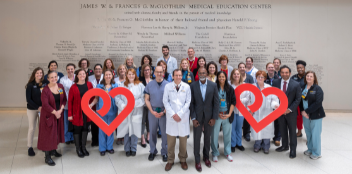COVID-19: Questions and answers with Drs. Kontos and Bhardwaj
 Dr. Michael Kontos
Dr. Michael Kontos
 Dr. Hem Bhardwaj
Dr. Hem Bhardwaj
COVID-19 can have a serious cardiovascular impact on patients. To learn more about the relationship between the novel coronavirus and heart health, we spoke with Pauley faculty Dr. Michael Kontos, medical director of the Coronary Intensive Care Unit and president of the Virginia chapter of the American College of Cardiology, and Dr. Hem Bhardwaj, director of echocardiography and inpatient care. They share their expertise and insight below.
Q. Individuals with existing health conditions, including cardiovascular disease, appear to be most at risk for severe complications from COVID-19. Can you elaborate?
A. Studies have shown that patients infected with COVID-19 who have underlying cardiovascular disease are at increased risk for mortality. In addition, cardiac risk factors, specifically hypertension and diabetes, have also been associated with higher risk. It is unclear if this higher risk is related specifically to these risk factors or because the patients with these risk factors tend to be older and have other associated comorbidities.
Q. It’s also been suggested that COVID-19 can cause cardiac injury in otherwise healthy patients. How does the coronavirus affect the heart?
A. Coronavirus affects the heart indirectly, and less commonly via its direct infection of the heart. Elevation of a specific cardiac biomarker called troponin, which can be detected when there is myocardial injury, has been associated with increased mortality in patients infected with COVID-19. Myocardial injury likely occurs as a result of patients having underlying coronary disease who are now under significant stress from their infection. Less commonly, it results from a direct effect on the heart due to the inflammatory reaction that is seen in patients with severe COVID-19.
There have been a number of reports of patients who present with ECG abnormalities that are consistent with an acute heart attack who, when they undergo coronary angiography, do not have significant heart blockages. This indicates that the ECG abnormalities are likely the result of an inflammation of the heart rather than a true heart attack.
Q. What findings are cardiologists observing in COVID-19 patients who receive echocardiograms relative to those without COVID-19?
A. There is limited data on patients who have had an assessment of heart function who have COVID-19. In general, they have shown relatively normal function early in the course of the disease, with some patients with severe infection developing heart dysfunction. In this small group, patients who recover from the infection have recovery of heart function, although data is currently limited.
Q. Are there any treatments for COVID-19?
A. There are a number of potential treatments for COVID-19 that have been in the news that are currently undergoing investigation. One that has been frequently commented upon is hydroxychloroquine, which is a commonly used for the treatment of lupus, and chloroquine, which has been used to treat malaria. Although initial small studies suggested a possible benefit, more recent larger trials have cast doubt, with some even indicating a harm with treatment. Larger, randomized studies are clearly needed as both drugs can have significant side effects. Other drugs that are undergoing investigation include antiviral drugs such as remdesivir (with VCU being one of the first institutions to be included in these trials) and anti-inflammatory drugs.
Q. What questions do your patients ask about COVID-19, and what are you telling them?
A. Patients often ask what symptoms to look for. Fevers, fatigue, cough and shortness of breath are common symptoms; however, gastrointestinal symptoms have also been noted. Treatment in general is symptomatic, with approximately 85% of patients infected having self-limited infection and not requiring hospitalization. Approximately 15% of patients will develop more severe symptoms that require hospitalization. Patients also ask what they can do to decrease risk. Social distancing and frequent hand washing are key.
Q. During this pandemic, what measures are you taking to ensure heart patients stay safe but also receive any necessary clinical care? For instance, have you adopted/increased the use of telemedicine?
A. Because of recommendations on social distancing, VCU Health has implemented the use of telemedicine to provide cardiac care to outpatients while at the same time ensuring the safety of all patients and clinic staff. For those who do require further evaluation, the option of seeing a provider in the office is still available. Patients with severe symptoms should not avoid seeking care, as delay may lead to worse outcomes.
Q. Do you have anything else that you would like to add?
A. There has been some controversy over whether patients taking medications called angiotensin converting enzyme inhibitors (ACEi) or angiotensin receptor blockers (ARBs), two common blood pressure and heart failure medications, have worse outcomes if they get COVID-19. Currently, there is no data indicating that these medications are harmful, and discontinuing them without physician consultation is not recommended. This is consistent with guidelines from multiple organizations, including the American College of Cardiology and the American Heart Association.
Visit vcuhealth.org/covid-19 to learn more about this virus.
Back to Spring-2020
Join our Pauley Consortium composed of patients, friends and advocates.

